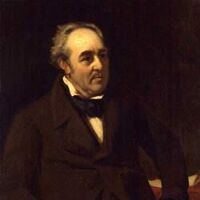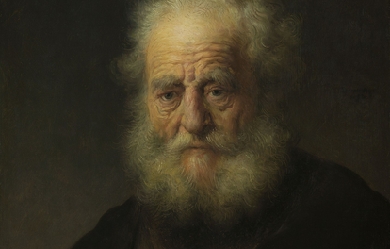Gebir (Fourth Book)
FOURTH BOOK.
The king’s lone road, his visit, his return,
Were not unknown to Dalica, nor long
The wondrous tale from royal ears delayed.
When the young queen had heard who taught the rites
Her mind was shaken, and what first she asked
Was, whether the sea—maids were very fair,
And was it true that even gods were moved
By female charms beneath the waves profound,
And joined to them in marriage, and had sons—
Who knows but Gebir sprang then from the gods!
He that could pity, he that could obey,
Flattered both female youth and princely pride,
The same ascending from amid the shades
Showed Power in frightful attitude: the queen
Marks the surpassing prodigy, and strives
To shake off terror in her crowded court,
And wonders why she trembles, nor suspects
How Fear and Love assume each other’s form,
By birth and secret compact how allied.
Vainly (to conscious virgins I appeal),
Vainly with crouching tigers, prowling wolves,
Rocks, precipices, waves, storms, thunderbolts,
All his immense inheritance, would Fear
The simplest heart, should Love refuse, assail:
Consent—the maiden’s pillowed ear imbibes
Constancy, honour, truth, fidelity,
Beauty and ardent lips and longing arms;
Then fades in glimmering distance half the scene,
Then her heart quails and flutters and would fly—
‘Tis her beloved! not to her! ye Powers!
What doubting maid exacts the vow? behold
Above the myrtles his protesting hand!
Such ebbs of doubt and swells of jealousy
Toss the fond bosom in its hour of sleep
And float around the eyelids and sink through.
Lo! mirror of delight in cloudless days,
Lo! thy reflection: ’twas when I exclaimed,
With kisses hurried as if each foresaw
Their end, and reckoned on our broken bonds,
And could at such a price such loss endure:
‘Oh, what to faithful lovers met at morn,
What half so pleasant as imparted fears!’
Looking recumbent how love’s column rose
Marmoreal, trophied round with golden hair,
How in the valley of one lip unseen
He slumbered, one his unstrung low impressed.
Sweet wilderness of soul—entangling charms!
Led back by memory, and each blissful maze
Retracing, me with magic power detain
Those dimpled cheeks, those temples violet—tinged,
Those lips of nectar and those eyes of heaven!
Charoba, though indeed she never drank
The liquid pearl, or twined the nodding crown,
Or when she wanted cool and calm repose
Dreamed of the crawling asp and grated tomb,
Was wretched up to royalty: the jibe
Struck her, most piercing where love pierced before,
From those whose freedom centres in their tongue,
Handmaidens, pages, courtiers, priests, buffoons.
Congratulations here, there prophecies,
Here children, not repining at neglect
While tumult sweeps them ample room for play,
Everywhere questions answered ere begun,
Everywhere crowds, for everywhere alarm.
Thus winter gone, nor spring (though near) arrived,
Urged slanting onward by the bickering breeze
That issues from beneath Aurora’s car,
Shudder the sombrous waves; at every beam
More vivid, more by every breath impelled,
Higher and higher up the fretted rocks
Their turbulent refulgence they display.
Madness, which like the spiral element
The more it seizes on the fiercer burns,
Hurried them blindly forward, and involved
In flame the senses and in gloom the soul.
Determined to protect the country’s gods
And asking their protection, they adjure
Each other to stand forward, and insist
With zeal, and trample under foot the slow;
And disregardful of the Sympathies
Divine, those Sympathies whose delicate hand
Touching the very eyeball of the heart,
Awakens it, not wounds it nor inflames,
Blind wretches! they with desperate embrace
Hang on the pillar till the temple fall.
Oft the grave judge alarms religious wealth
And rouses anger under gentle words.
Woe to the wiser few who dare to cry
‘People! these men are not your enemies,
Inquire their errand, and resist when wronged.’
Together childhood, priesthood, womanhood,
The scribes and elders of the land, exclaim,
‘Seek they not hidden treasure in the tombs?
Raising the ruins, levelling the dust,
Who can declare whose ashes they disturb!
Build they not fairer cities than our own,
Extravagant enormous apertures
For light, and portals larger, open courts
Where all ascending all are unconfined,
And wider streets in purer air than ours?
Temples quite plain with equal architraves
They build, nor bearing gods like ours embossed.
Oh, profanation! Oh, our ancestors!’
Though all the vulgar hate a foreign face,
It more offends weak eyes and homely age,
Dalica most, who thus her aim pursued.
‘My promise, O Charoba, I perform.
Proclaim to gods and men a festival
Throughout the land, and bid the strangers eat;
Their anger thus we haply may disarm.’
‘O Dalica,’ the grateful queen replied,
‘Nurse of my childhood, soother of my cares,
Preventer of my wishes, of my thoughts,
Oh, pardon youth, oh, pardon royalty!
If hastily to Dalica I sued,
Fear might impel me, never could distrust.
Go then, for wisdom guides thee, take my name,
Issue what most imports and best beseems,
And sovereignty shall sanction the decree.’
And now Charoba was alone, her heart
Grew lighter; she sat down, and she arose,
She felt voluptuous tenderness, but felt
That tenderness for Dalica; she praised
Her kind attention, warm solicitude,
Her wisdom—for what wisdom pleased like hers!
She was delighted; should she not behold
Gebir? she blushed; but she had words to speak,
She formed them and re—formed them, with regret
That there was somewhat lost with every change;
She could replace them—what would that avail?—
Moved from their order they have lost their charm.
While thus she strewed her way with softest words,
Others grew up before her, but appeared
A plenteous rather than perplexing choice:
She rubbed her palms with pleasure, heaved a sigh,
Grew calm again, and thus her thoughts revolved—
‘But he descended to the tombs! the thought
Thrills me, I must avow it, with affright.
And wherefore? shows he not the more beloved
Of heaven? or how ascends he back to day?
Then has he wronged me? could he want a cause
Who has an army and was bred to reign?
And yet no reasons against rights he urged,
He threatened not, proclaimed not; I approached,
He hastened on; I spake, he listened; wept,
He pitied me; he loved me, he obeyed;
He was a conqueror, still am I a queen.’
She thus indulged fond fancies, when the sound
Of timbrels and of cymbals struck her ear,
And horns and howlings of wild jubilee.
She feared, and listened to confirm her fears;
One breath sufficed, and shook her refluent soul.
Smiting, with simulated smile constrained,
Her beauteous bosom, ‘Oh, perfidious man!
Oh, cruel foe!’ she twice and thrice exclaimed,
‘Oh, my companions equal—aged! my throne,
My people! Oh, how wretched to presage
This day, how tenfold wretched to endure!’
She ceased, and instantly the palace rang
With gratulation roaring into rage—
‘Twas her own people. ’Health to Gebir! health
To our compatriot subjects! to our queen!
Health and unfaded youth ten thousand years!'
Then went the victims forward crowned with flowers,
Crowned were tame crocodiles, and boys white—robed
Guided their creaking crests across the stream.
In gilded barges went the female train,
And hearing others ripple near, undrew
The veil of sea—green awning: if they found
Whom they desired, how pleasant was the breeze!
If not, the frightful water forced a sigh.
Sweet airs of music ruled the rowing palms,
Now rose they glistening and aslant reclined,
Now they descended, and with one consent
Plunging, seemed swift each other to pursue,
And now to tremble wearied o’er the wave.
Beyond and in the suburbs might be seen
Crowds of all ages: here in triumph passed
Not without pomp, though raised with rude device,
The monarch and Charoba; there a throng
Shone out in sunny whiteness o’er the reeds.
Nor could luxuriant youth, or lapsing age
Propped by the corner of the nearest street,
With aching eyes and tottering knees intent,
Loose leathery neck and worm—like lip outstretched,
Fix long the ken upon one form, so swift
Through the gay vestures fluttering on the bank,
And through the bright—eyed waters dancing round,
Wove they their wanton wiles and disappeared.
Meantime, with pomp august and solemn, borne
On four white camels tinkling plates of gold,
Heralds before and Ethiop slaves behind,
Each with the signs of office in his hand,
Each on his brow the sacred stamp of years,
The four ambassadors of peace proceed.
Rich carpets bear they, corn and generous wine,
The Syrian olive’s cheerful gift they bear,
With stubborn goats that eye the mountain tops
Askance and riot with reluctant horn,
And steeds and stately camels in their train.
The king, who sat before his tent, descried
The dust rise reddened from the setting sun.
Through all the plains below the Gadite men
Were resting from their labour; some surveyed
The spacious site ere yet obstructed—walls
Already, soon will roofs have interposed;
Some ate their frugal viands on the steps
Contented; some, remembering home, prefer
The cot’s bare rafters o’er the gilded dome,
And sing, for often sighs, too, end in song:
'In smiling meads how sweet the brook’s repose,
To the rough ocean and red restless sands!
Where are the woodland voices that increased
Along the unseen path on festal days,
When lay the dry and outcast arbutus
On the fane step, and the first privet—flowers
Threw their white light upon the vernal shrine?'
Some heedless trip along with hasty step
Whistling, and fix too soon on their abodes:
Haply and one among them with his spear
Measures the lintel, if so great its height
As will receive him with his helm unlowered.
But silence went throughout, e’en thoughts were hushed,
When to full view of navy and of camp
Now first expanded the bare—headed train.
Majestic, unpresuming, unappalled,
Onward they marched, and neither to the right
Nor to the left, though there the city stood,
Turned they their sober eyes; and now they reached
Within a few steep paces of ascent
The lone pavilion of the Iberian king.
He saw them, he awaited them, he rose,
He hailed them, ‘Peace be with you:’ they replied,
‘King of the western world, be with you peace.’


